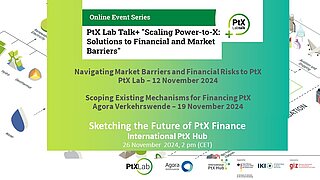Scaling Power-to-X: solutions for financial and market barriers
Copyright: iStock/loveguli
PtX Lab Lausitz and international experts discuss solutions for overcoming market barriers and financial risks in Power-to-X technologies.
Power-to-X (PtX) technologies are becoming an important factor in the global energy transition. From the production of green fuels to the provision of sustainable chemical raw materials, PtX offers solutions for making renewable energies efficiently usable. Nevertheless, the industry faces significant challenges: high initial investments, uncertain regulatory frameworks and complex financing mechanisms make it difficult to implement and scale such projects.
The three-part event series ‘Scaling Power-to-X: Solutions to Financial and Market Barriers’ addressed precisely these topics. In cooperation with Agora Verkehrswende and the International PtX Hub, obstacles to market entry were analysed and innovative financing models discussed in dialogue with international experts. The aim was to identify practical approaches and synergies that can drive the expansion of PtX solutions.
Findings from the Sessions
Navigating Market Barriers and Financial Risks to PtX | Session 1 on 12 November 2024
In the first session on 12 November 2024, organised by PtX Lab Lausitz, the focus was on the market barriers and financial risks that are currently delaying PtX projects. Particular emphasis was placed on the technological, regulatory and financial barriers that characterise the market.
Regulatory uncertainty and complex requirements, as well as the dependence on energy prices, were identified as particular hurdles to the transformation of grey and blue ammonia to green ammonia. As solutions, fewer but more targeted regulations and uniform, transparent standards were proposed.
Furthermore, the importance of energy security and stable, long-term framework conditions was emphasised. Other key points included compliance with the Renewable Energy Directive (RED), the implementation of criteria for the use of renewable fuels of non-biological origin (RFNBO), and the establishment of industrial partnerships, which play a key role in the development of offtake contracts, in order to achieve the final investment decision (FID). Examples such as AM Green/Greenko showed how strategic partnerships can drive progress.
Videorecording of Session 1

Scoping Existing Mechanisms for Financing PtX | Session 2 on 19 November 2024
The second session on 19 November 2024, organised by Agora Verkehrswende, focused on existing financing mechanisms for PtX projects. It became clear that increased public support is needed to ensure the long-term stability of cash flows. For many projects, tailored financing approaches were considered important to mitigate risk profiles.*
Auction mechanisms such as H2Global or Power-to-Liquid (PtL) kerosene offer a first step towards establishing market pricing models, but need further development. It was also emphasised that a combination of different financing instruments and political support (e.g. World Bank programmes) is needed to meet the different requirements of the projects.
Videorecording of Session 2

Sketching the Future of PtX Finance | Session 3 on 26 November 2024
The third and final session on 26 November 2024, hosted by the International PtX Hub, looked at the future of PtX financing. The urgent need to make public funds available, particularly in the early phases up to the financing decision, was highlighted here.
Another important point was the importance of matchmaking, i.e. networking between investors, banks and developers, in order to efficiently advance PtX projects. Innovative matching tools such as ETAF from IRENA or FSA in Chile should provide support here.
Finally, it was pointed out that building on established global partnerships and proven instruments can accelerate the success of PtX projects.
Videorecording of Session 3

Scaling PtX requires regulations, financing models and cooperation
The PtX Lab Talk+ series of events showed that scaling PtX technologies requires a systemic interplay of regulatory clarity, innovative financing models and international cooperation.
The discussions provided valuable impetus for a sustainable transformation of the energy and chemical industries and underscored the importance of decisive action at both the political and industrial level.
With clear guidelines, increased funding and strategic partnerships, PtX can become the key to a climate-friendly future.
Contact
Dr
Harry Lehmann
Head of PtX Lab Lausitz
+49 151 40 171 692
Write E-Mail
more information

